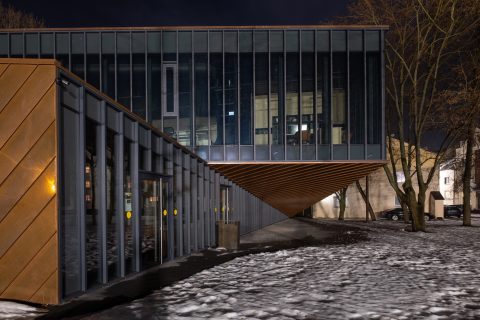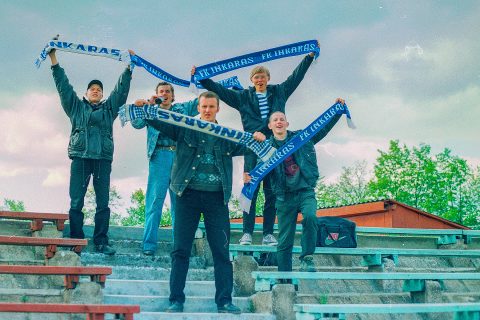While we focus more on professional sports and professional passions in the April issue, it shouldn’t be forgotten that that professionalism was created from scratch. Many sports, generating billions in revenue today, were once born out of a desire to move and share emotions. And you don’t have to be in ideal physical shape if you just want to try yourself. Thus, the members of the football team FC Kiemas – Agnė Smolienė, who works at Kaunas Artists’ House, Laura Savickė, who creates leather products, and Sigita Žemaitytė-Strazdė, a member of the Kaunas City Museum team – talk about their experiences running in football boots on a greenfield chasing the ball.
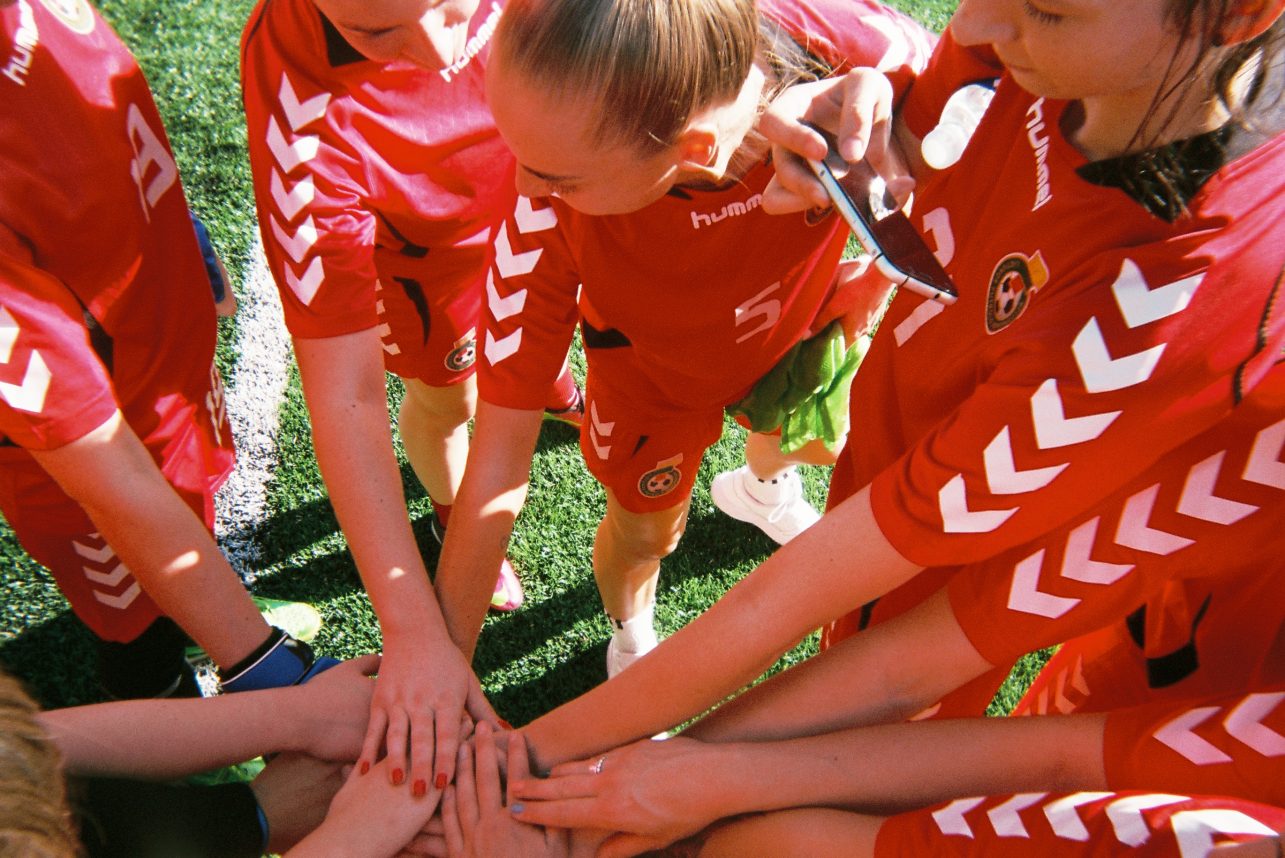
Why football? Why not volleyball, basketball, or dodgeball?
Agnė: I played both basketball and dodgeball at school, but football gives me special emotions. I discovered it during my studies in Vilnius when after the lectures we would meet with friends to play some football. The guys had their own team, FC Vova, and they would play in a Sunday League, and we girls tried to keep up. We had an unofficial team, even uniforms: blue skirts with shorts underneath. Even today, I couldn’t say what sport they were actually for. We played very badly, but most importantly: it was fun. We spent almost every evening like this, even in winter. I remember playing on icy school playing-fields, maybe the current knee pains remember that winter as well. After those nostalgic times, I didn’t play football for more than ten years until I decided to include my six-year-old daughter in the sport. After unsuccessful attempts to find anyone who would provide training for girls this age, I realized that it was probably me rather than my daughter who actually wanted to play. I made a deal with a coach that if I organized a group of at least five women, she would start coaching us. That’s how it all started. And while many things happened during those three years, football refuses to let me go.
Laura: In my life, football showed up unexpectedly but stayed for a long time. I never thought I would want to play football until I received an offer from Agnė to join a new team of female amateurs. It is a very interesting team sport with many components. What fascinates me the most is the ball control techniques that you can use to trick the opponent.
Sigita: Football gives me joy. The simplest joy. It’s fun to dribble, fun to pass the ball accurately, fun to score a goal, learn something new and win. In one video that teaches various dribbling tricks, the coach said, “Football has to provide joy.” And that is how it is. Differently than in basketball, goals don’t happen that easily, it takes time, and sometimes the match is far from high scoring. But it is fun to watch football precisely because of this intrigue that lasts 90 plus minutes.
Why FC Kiemas? Do you equate the football field with the yard (kiemas), where you’d rush to play after school as kids?
Laura: I think it’s because the football field in my childhood yard wasn’t a place for girls. I remember very well how there were football matches taking place between teams of different courtyards, but only boys took part in them and the girls’ function was to support the teams. I remember that back then, this did not raise any questions. And now, when I think about it, if not for those stereotypes, I would have scored more than one goal as a child. I would like these stereotypes to change so the girls of today could play football with no problems; to have a mental image of how that looks like. Agnė’s daughter would come to see how our team is training and after several times she couldn’t wait to try it. I am glad that today she has already joined the girls’ team.
Sigita: At least during training we really get loose and more than once, when telling someone about my team, I have mentioned the returning feeling of how I sed to kick the ball with my yard friends as a kid. Of course, we are much more disciplined during matches but even so, the most important thing you have to take with you from all the time spent in the field is positive emotions. I believe that my teammates think so as well.
Agnė: In fact, this image of the yard has been in our team from the very beginning. Since I didn’t know a single Kaunas woman who would like to play football, I searched everywhere, and first of all, in the neighborhood. This is how the first three players appeared, all from K. Būgos Street (including Laura). Later we even trained on the field of the nearby V. Kudirka progymnasium. So, the name came about very naturally, and now it has more meanings.
Football unites you. And what separates you?
Sigita: Temperament. Each of us can react differently to our own or someone else’s mistake or any type of situation. But, I guess, we are slowly getting used to each other.
Laura: Obviously, football is not just a game or just a sport for us. But what else? Culture, community, self-expression, or perhaps a tool to combat discrimination against women? Women’s football in Lithuania occupies a very small niche in general, and the football culture itself is outdated. I think what sets us apart the most is that the vision of the “yard league” is vague, so we often see the future of the team differently. An alternative culture of women’s football is still taking shape (I don’t know, maybe not even that, maybe we’re just imagining it) and there’s still a long way to go before we reach a clearer cultural foundation or inspiring example that would help us unite the team and see its image more clearly.
Agnė: At the beginning, we were all united not so much by football as by the professional field. Since I wanted to bring together a team of friends or at least like-minded people, I invited colleagues working in the field of culture and art to join. Architects, designers, cultural field specialists, etc. As you know, people working in these fields usually do not have specific working hours, so they do not count overtime. It was hard to find girls who would be free at 7 p.m., would not exchange training for an effortless visit to the cinema and would have energy to play. So now, we don’t care about professions but value motivation. I would agree with Laura and Sigita that we are distinguished by our characters and values. You can’t change the characters but a team, the players of which burn with the same ideas, is my dream.
What is movement to you? A way to express negative emotions or something simpler?
Laura: Not only to release emotions, but also to forget all worries and work. I always arrive to the training session after work with a head still full of work-related things, but it all dissolves the second you get to the field. After a harder day, you catch yourself kicking the ball into the wall and when a teammate asks you if everything is OK, you answer, “Much better now.”
Sigita: When walking or running you hope to turn off the brain, but usually the opposite happens, it switches to some kind of clarity mode. Then you start to see things that seemed confusing and unsolvable just a few minutes ago differently. I think that long walks, jogging, or cycling are necessary for people who work in the cultural industry because of that sense of clarity that I mentioned. Football, of course, is something else. It’s not meditation and being with yourself, it’s more of letting it all out. Movement is necessary for a person. And that is probably what each of us understood clearly during the quarantine.
Agnė: I don’t bring bad emotions or unfinished jobs to the field. I put on my boots and it seems that the world that existed before I came to the training, seized to exist. Also, football is not the typical kind of movement. To avoid injury and focus on technique rather than physical interference, you need to move in parallel. Professional athletes train every day, and we only meet once a week, so we need to maintain the same amount of fitness for the rest of the week with other forms of exercise. I fill that gap with easy jogging and yoga. I remember not being able to climb the stairs to work the next day after the training session and I also had a broken leg due to weak ligaments. I would not repeat these mistakes.
What kind of coach is a good coach?
Agnė: We are lucky to have female coaches in general! I am very glad that Ugnė and Andželika have agreed to take part in this adventure and still have the enthusiasm to work with us. I am amazed at how open the younger generation of coaches is as if unconstrained by stereotypes, even though they work in the same structure. Ugnė and Andželika also train girls, my older daughter plays in the team and the four-year-old also tried it out. Watching how much patience coaches have in teaching distracted kids, I thought that they will be able to train us too. A year ago, my colleagues and I decided to attend individual swimming classes and met another Ugnė in Vilija swimming pool. It turns out that swimming coaches do not have to scream and can be really pleasant.
Sigita: I think that a coach must have empathy. Especially when you have to work with adults, whose personalities are already formed. Empathy makes it easier to understand situations, moods of the team and, I believe, to achieve a long-term result by using the right methods. Yet the coach should be moderately strict so that the fun part of football wouldn’t overshadow such an important discipline. So far, I’ve only come across good examples of coaching and I’m very happy about that.
Laura: A good coach is one who sees the strengths of each team member, helps to discover and use them; one who can unite and motivate the team.
Do you manage to discuss the topicalities of the work – i.e., culture – during the training, or do you forget what you did during the day the minute you put on the boots?
Agnė: Oh, you don’t have time or opportunities to talk during training! We were used to meeting for a chat before the workout with Laura and Sigita, but it doesn’t always work out.
Laura: I think we should meet outside of training more often, especially considering that football is a lot more to us than just sports.
Sigita: There is definitely no opportunity to discuss work when we’re playing, warming up, or figuring out a technique. Both before and after a workout, we usually talk about things related to football, how we manage or not to do certain things. I joined the team a couple of years ago and I have already found a nucleus here, so I am getting to know the girls gradually. Many of us come from the same cultural sector, we operate in the same circles and face the same problems, so it is only natural that such topics keep popping up. However, I think the most important thing is that we are united by the same values.
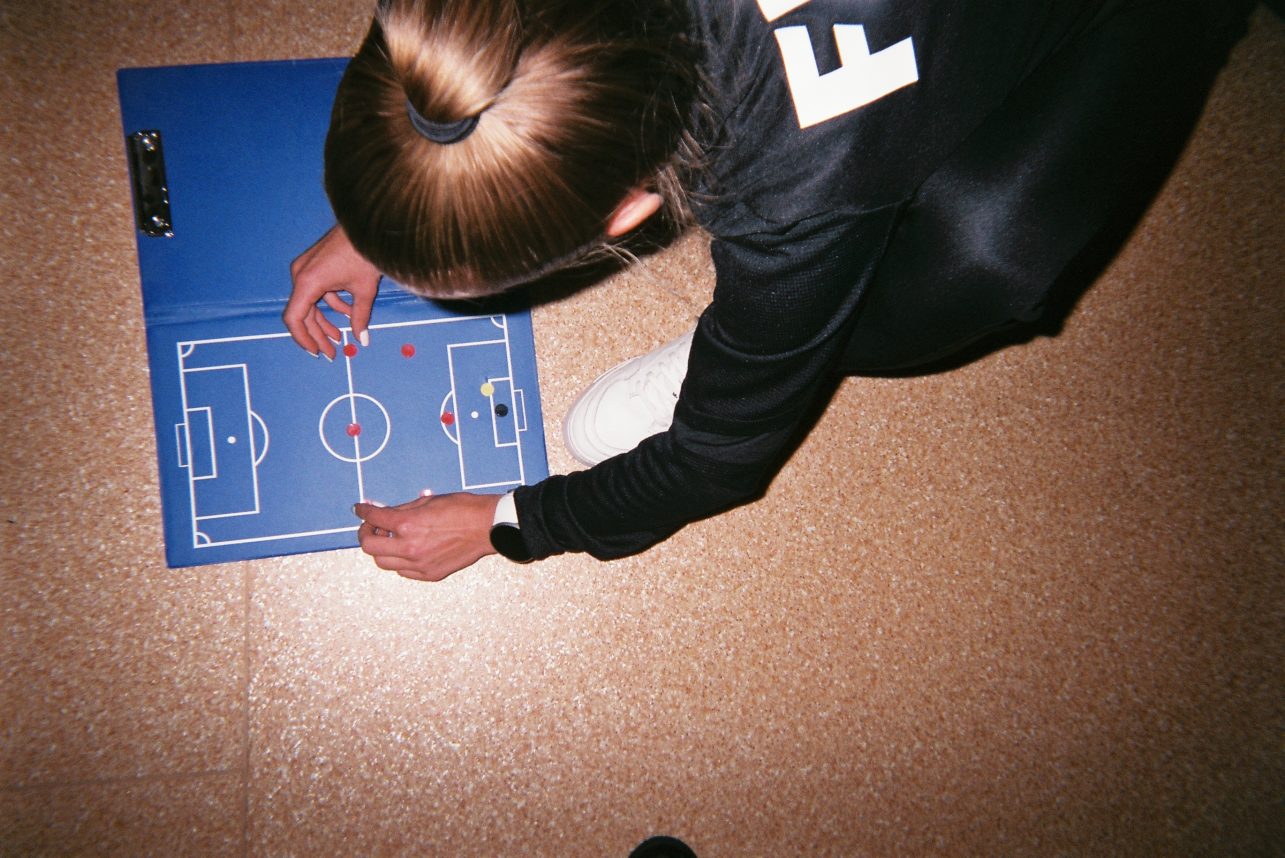
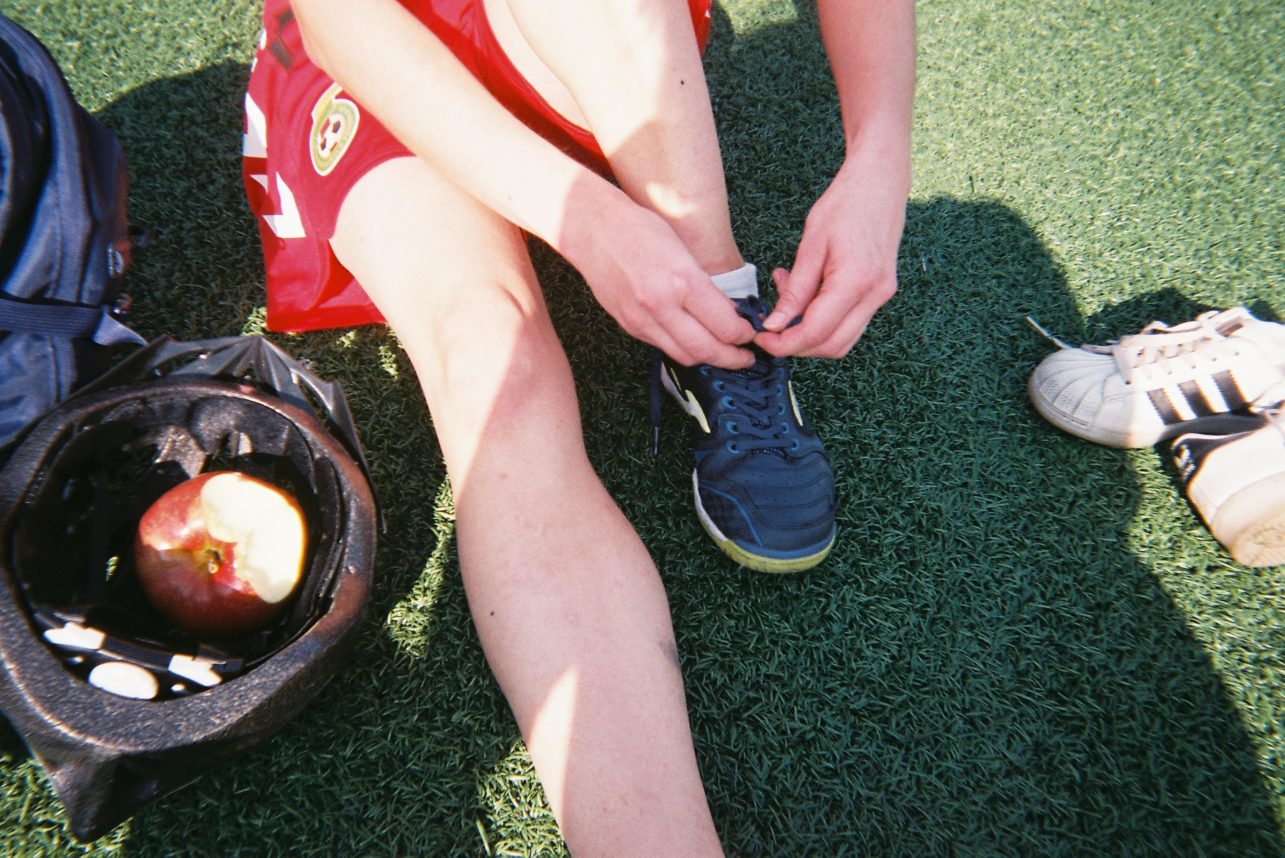
How does the sports experience, the understanding of football schemes help in everyday life?
Laura: I think I mostly learn teamwork from football. It helps you realize that you cannot do things on your own, there is a need to get to know each member of the team, to know their strengths and weaknesses, and to use this for a common goal. I also realize what an important role in the game is played by communication, which we develop during training and then use in our daily activities. Well, and, of course, strategizing; the ability to anticipate the actions of the opponent.
Agnė: Sports team is very different from, say, your team at work. Passions are more common here (just because of the adrenaline), so it takes more effort to control yourself, not to hurt or offend your teammate or an opponent. And when it comes to schemes, sometimes there are tasks in the training session that seem to turn everything upside down, and you need to really work your brain to implement them.
Sigita: Well, yeah, maybe I was focusing too much on that fun part of football. It is actually a very strategic game and I should learn a lot more in this regard. Team sports primarily teach teamwork, understanding and “reading” the other person, improvising in a situation, and so on. If we transferred this to work or everyday life, the features of team sports could be applied in creative projects, where everyone, like on the football field, has their own roles and the success of the projects depends only on good play.
What is your vision for adult non-professional sports in Kaunas? What would it take to have more enthusiasts, teams, events? Or what we have now is enough?
Agnė: I am very happy that there are more and more opportunities to discover sports that were previously inaccessible to the average person. For example, the girls’ hockey class, which lured away one of our players. However, making professional sports accessible to amateurs still costs a great deal of effort. Professional coaches are reluctant to invest in amateur training because, let’s be honest, amateurs have no prospects. Secondly, if you can easily train outdoors in the summer, then during the cold season you can go rest because you will not get a gym. And thirdly, if despite all these obstacles you still have a coach and a gym, then it’s a headache to pay for all that. So, of course, I would like some support for these initiatives at the municipal, state, or finally, federal level.
Laura: There are few sports events in Kaunas, or they are not talked about loudly. I believe that sport needs to be integrated into many cultural events. It is very important to involve individual communities and businesses in improving sports infrastructure both in the city centre and in more remote districts.
Sigita: We need more of everything. Probably the most important problem faced by non-professional teams is the lack of infrastructure. It is difficult to get a gym or a training ground and without these things, it is difficult to gather enthusiasts and so on. I do not believe that there are not enough women in Kaunas (I am talking about them, because the situation is a bit different with men) who would be burning with desire to kick a football. In most cases, there is a lack of suitable training conditions. In women’s non-professional sports, stereotypes often still need to be combated, but I believe that the situation will gradually change.
Do you follow professional women’s football?
Sigita: In fact, I became more interested in it when I joined the team. I follow MFK Kaunas Žalgiris and Šiauliai Gintarai. When I started going to professional women’s football matches, I realized how big of a contrast there was between the organization of women’s and men’s football matches. I remember that in one meeting of MFK Kaunas and, I think, Šiauliai football academy, even the scoreboard showing the results was not turned on. And that’s just one of the details you’d notice going to the most serious women’s A-League match. Women’s football seriously lacks attention despite the talent which is present.
Agnė: I’m more of a grassroots football fan. I follow amateur women’s teams in the UK, Russia. I envy their enthusiasm, they have so many teams! Of course, I follow stars like U.S. footballer Megan Rapinoe, and I am truly amazed by the extremely talented younger girls who could already play professionally. In fact, I’m not an active observer of matches, I prefer to watch videos with the already selected most beautiful passes or goals.
Laura: I’m only interested as much as I get to face it by chance.
Tell us more about the Goal Click project you are involved in.
Agnė: I discovered the Goal Click project on Instagram through amateur football teams in London that I follow. At that time, we had started training again after a longer break. We had a new coach and – for the first time – a warm gym for the winter season. There was stuff to tell, so I submitted our story and soon received a response that we can get involved in the project. The aim of the Goal Click initiative is to tell the story of football from different perspectives, using the photographs made with the disposable camera they send. When you finish the film, you send the camera back to London, Goal Click develops the photos and posts them on their social media along with the accompanying story. Their cameras had probably travelled to all the continents. And out story should appear in late March.
Laura: I was fascinated by this project because it tells stories about football from up close via the participants themselves (or more precisely, via the lens of an analogue camera). The stories are very different, from the most unexpected corners of the world. When Agnė told us about this project, I had no doubts about participating in it.
And what do you substitute football with during quarantine?
Sigita: When there wasn’t so much snow, I tried to exercise on the football field near the house. Now it is only possible to jog or take long walks in the forest.
Agnė: When you could still see the coating of the football field, just like Sigita, I would go out to play with my daughter. And now at home I try to do yoga for at least half an hour every day.
Laura: A very sensitive topic. I maintain the level of fitness only by jogging. I still haven’t found what to replace communication with the team and expressing my emotions with. Needless to say, all of this is sorely lacking. Building a team of adult and busy women is hard work. After such a long break from training, we will not only have to get back into shape but also reunite and motivate the team members.
Agnė: As for the beginning of the new season, we invite all willing women. Neither age nor experience is important (most of us started from scratch). You can find us on our Instagram account @Kiemas_fc.

